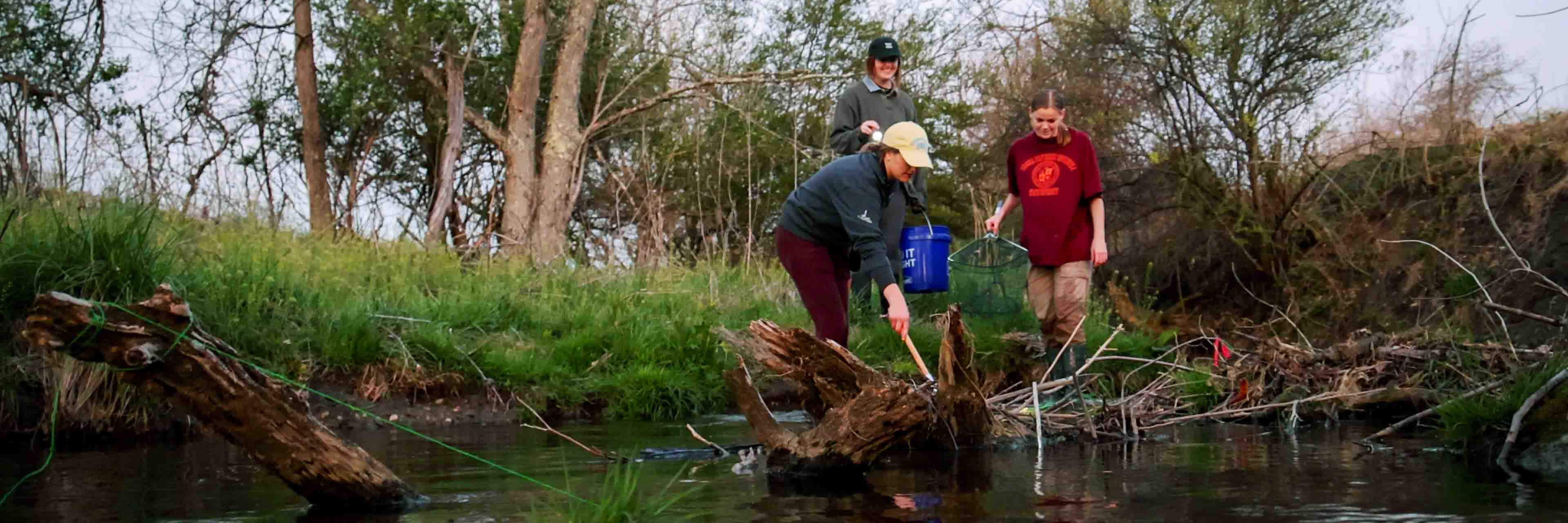Minors

Want to delve into a topic beyond your major?
From cutting-edge geospatial technology and climate science to conservation and packaging systems and design, CNRE minors allow you to study a variety of environmental and sustainability topics. You’ll take courses to enhance your knowledge and skills, while gaining experience outside of the classroom that will prepare you for a career or graduate school. Our minors can take you to the Drone Park, into laboratories and forests, on a storm chase, and so much more.
Students get their feet wet as biodiversity conservationists
02:00
Minors in the College of Natural Resources and Environment
You can see a list of minors offered through the college below; all Virginia Tech minors are available here. Each minor requires a certain set of courses and a minimum of 18 credit hours.
Pathways minors are versatile, transdisciplinary programs that allow students to study a variety of topics while completing general education requirements along the way and are noted below.
Biodiversity conservation
Explore the effects of overutilization of animal and plant populations, the loss and degradation of U.S. and global habitats, and the impacts of pollution on biodiversity.
Learn moreBlue planet
Learn about the sustainable management of water resources from a wide range of perspectives and discover the interconnectedness of water policy, planning, science, and sustainability.
Learn moreClimate and society
Delve into the complex science and causes of global climate change and study its societal, environmental, and economic impacts.
Learn moreEcological cities
Explore ways to integrate the natural world with built environments and learn about the ecological, social, and design challenges inherent in creating new urban environments.
Forestry
Broaden your ability to work with forest-related issues by learning about forest ecology, forestry fundamentals, tree identification, and land measurements.
View ChecksheetGeographic information systems
Utilize cutting-edge geospatial and satellite imaging technology to solve problems related to natural disasters, the spread of disease, urban sprawl, climate change, transportation, the global economy, and more.
View ChecksheetGeography
Explore the relationship between humans and the planet by learning about human geography, world regions, and physical geography.
View ChecksheetMeteorology
Learn about weather forecasting and atmospheric science, with a significant focus on using geospatial technology to study how landforms affect weather patterns.
View ChecksheetNatural resources recreation
Learn the tools and perspectives needed to manage and maintain high-quality recreation resources and experiences, with an emphasis on the ecology of setting, the psychology of recreation experiences, and the management science behind trails, parks, scenery, and facilities management.
View ChecksheetPackaging systems and design
Discover how sustainable, green packaging can eliminate waste and pollution in the environment, how packaging design enhances products, and how smart materials are used in food and drug packaging to improve safety and quality.
View ChecksheetPathways to sustainability
Learn more about systems thinking across natural, social, and economic contexts by integrating perspectives and tools from natural and social sciences with those from art, design, and humanities.
Learn moreSustainable biomaterials
Acquire the hands-on experience and knowledge needed to design and build innovative and sustainable products, buildings, and other renewable materials while minimizing waste.
View ChecksheetUrban and community forestry
Develop expertise in managing forest resources in urbanized areas and learn to address the specific challenges related to trees in the built environment.
View ChecksheetWatershed management
Learn about watershed science, policy, and decision-making in order to prepare for a career such as a hydrologist or water quality manager.
View ChecksheetWildland fire ecology
Acquire hands-on experience and knowledge of wildland fire behavior, ecology, management, and applied science while preparing for an environmental career.
View ChecksheetReady to make a minor adjustment?

If you’ve found a minor that interests you, your next step will depend on whether you are a current or prospective student. You can see the courses required for any minor through the University Registrar checksheets.
If you are a current student at Virginia Tech and would like to add a minor in CNRE, complete the Minor Declaration form available on the Advising Center page. Instructions for submitting the form electronically can be found on the same page. If the minor is in another college, schedule an advising appointment with that college and fill out the appropriate form.
If you are a prospective first-year or transfer student, contact John Gray Williams, director of recruiting, at jghokie@vt.edu to learn more and apply for admission.
If you’re still looking for the perfect major, look to CNRE
Take some time to explore all the majors offered by the College of Natural Resources and Environment. Learn more about the courses you’ll take, why you should study at Virginia Tech, and the kinds of careers pursued by graduates in the field.



